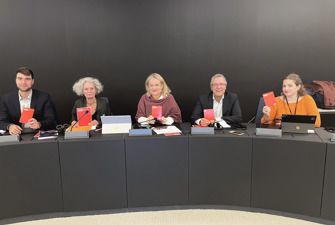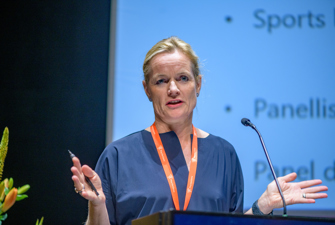On sport and kleptocracy
Why have politicians not woken up to the dangers that sport can pose to democracies by enabling "grand corruption"? That question was raised in a report commissioned by the now former MEP Viola von Cramon on the need for a global agency against all forms of corruption in sport.
In 2022, the German MEP from the Green Party, Viola von Cramon, launched a campaign to set up a global agency to combat corruption in sports. Unfortunately, von Cramon, recently lost her seat in the European Parliament as Europeans took a right-wing turn against climate and environment politicians.
Viola von Cramon’s report 'Finding Global Responses to Corruption in Sports' is one of the building blocks in Play the Game’s current project 'ClearingSport – towards an agency countering crime and protecting integrity in world sport'.
Therefore, Play the Game wishes to pay tribute to Viola von Cramon’s efforts to get European politicians to act on the threats from corruption in sport by republishing the introduction to the report written by German reporter and Play the Game-award winner Grit Hartmann. We do so in the hope it will inspire those MEPs who will serve for the next five-year term
Published on www.stopcorruptioninsports.eu in October 2022, this chapter almost proved prophetic as Belgian police two months later arrested the vice-president of the European Parliament, Eva Kaili, and a number of consultants close to the political work. Investigations are still ongoing into alleged influence-peddling from Qatar with the purpose of, inter alia, preventing political action against the FIFA World Cup in 2022.
The Russian invasion of Ukraine has drawn new attention to the problem of corruption around the globe. Governments are tracking assets of oligarchs and identify Western enablers who helped siphon billions and hide them offshore. They try to scale back economic entanglement not only with Russia, but also with ether authoritarian states.
The Club of Madrid issued an appeal of 42 former prime ministers and presidents calling for the creation of an International Anti-Corruption Court to deter and punish "grand corruption". The term describes the abuse of public power that benefits a few at the expense of the many, as perpetrated by state actors and their elites.
So far, the wave of democratic solidarity to fight back against kleptocracy has left out an area that reaches deep into the fabric of societies and provides a platform like no other: sport.
Yet sport is arguably the only stage where the now targeted "grand corruption" has played out for some time now, for the whole world to watch, with compliant sports officials amplifying the reach of autocrats while obfuscating the damage done:
The 2014 Sochi Games weren't just a gigantic self-enrichment party for the Kremlin's oligarchs with billions embezzled. The International Olympic Committee with the German Thomas Bach at the helm boosted Putin's popularity and provided him with a springboard for the annexation of Crimea.
With Beijing 2022, global sport lent legitimacy to Xi Jinping's genocide against the Uyghurs by abiding to the Chinese Communist Party's (CCP) censorship over it. With Qatar, the Federation Internationale de Football Association, better known as FIFA, and its president Gianni lnfantino are doing their best to perpetuate the narrative of a country that is first and foremost open to the world and not a monarchy that lives off the exploitation of tens of thousands of migrant workers.
Sports' top officials have put out a welcome mat for the world's kleptocrats, offering a conduit for the transformation of corruption into an instrument of national strategy to them. This included bribing officials to win some of the bids. The usual, many may think by now, although even the dedicated US prosecutors have yet to uncover who exactly from Russia and Qatar paid the millions for becoming host of FIFA World Cups in 2018 and 2022.
The problems are unlikely to blow over
So, why have politicians so far not woken up to the dangers that sport can pose to democracies by enabling "grand corruption"?
Certainly, some believe, it will all blow over soon, after the World Cup in Qatar. The IOC will happily move on to the Games in Paris, and FIFA to Canada, Mexico and the United States with the next World Cup.
This could be a false assumption: The links between the upper echelons of global sports governing bodies and autocrats are not tied to some prestigious event, they are ingrained in the power structure of these organisations, with proxies of authoritarian states "volunteering" all over sports and injecting their millions.
It is, even with the Russian warmongers, not over - Putin's oligarchs are not suspended from their posts in sports federations. Consequences this could entail for circumventing sanctions, including money laundering? It is only sport, isn't it?
However, the area that should promote health, teach solidarity and connect people on a level playing field, enhance peace, all the good ideals that are considered a common and just cause, worth funding with billions from public budgets, has lost public trust on a large scale.
This is manifest, for example, in the rejection of Olympic bids wherever citizens have been asked, or in an all-time-low in TV-ratings for the Beijing Games, and it is evident in the numerous protests against the World Cup in Qatar.
Cases of bribery and fraud, of officials involved in match-fixing and abuse of children have undermined elite sport, and largely destroyed it as a role model.
Global sport bears the markings of a kleptocracy
In fact, global sport itself bears the markings of a kleptocracy, which is usually associated with authoritarian forms of government. Who would not see the parallels in dubious practices that are standard in sport as in any autocracy and count in democracies as warning signs for systemic abuse of power?
When yet another IOC session is underway where the president's proposals get 99 per cent approval and adulatory speeches are set up? Or at elections in international federations, where yet again a president is confirmed "by acclamation"? When "unity" and "harmony'' are hailed and the few opponents are ostracised, sometimes with the help of so-called Ethics Committees? Let alone, in the large-scale thievery both are associated with?
The most striking parallel to kleptocracies, however, lies in the impunity for the rulers. None of the major scandals were uncovered by the sports system, but by state investigators or journalists.
The lack of accountability and rule of law is by design. Sports governing bodies have the mandate to regulate themselves and their sport without checks and balances from the outside. They hold up the so-called autonomy of sport as an iron law to avoid "interference" - though autonomy isa myth in autocratic countries where sport is often firmly in the grip of political rulers.
So far, not even the efforts to limit the global influence of the kleptocrats have led to political reflections on this autonomy.
There are new challenges that pose corruption risks to sport, to name just a few: the technological advances that continue to transform the way sport is played and consumed, with esports joining traditional events like the Asian Games; the numerous competition formats international and continental federations develop to attract new audiences and investors; private money flowing increasingly into elite sports (in 2021, equity funds alone invested $51 billion globally).
And finally: The Russian owners of football clubs haven't been the only reasons for raising concerns regarding strategic corruption and image laundering.
Lawmakers are focused on other things in sport than corruption
European institutions keep to their traditional approach, stressing the social and cultural values of sport, engaging (or becoming engaged) in dialogue with sports governing bodies. In 2021, when the debate about the so-called European model of sport (which sports officials said needed to be "protected") flared up again in response to the doomed breakaway Super League in football, athletes warned: a system that had allowed the abuse of power to the detriment of athletes and sport itself did not deserve protection by European governments or organisations.
Still, lawmakers seem to be focused on promoting new guidelines for good governance in sport, only now and again adopting a declaration against corruption. As last year's study on EU sports policy phrased it: "No control or sanctions measures are known to exist as these are not desired by organised sport."
The same study asked 187 "key stakeholders" - sports officials, academics and EU representatives - about their perceptions of EU sports policy. From a list of 30 categories, they had to choose the most important areas for the future.
"Corruption/sports betting" made it to 9th place, between "Human rights" and "Safeguarding/protection of children". Compared to the ranking for the present, this was a 10-place upgrade, the biggest jump of any sector in a perceived future EU sports policy.
What this paper proposes and why
This paper does not add to academic analysis of corruption. lnstead, after briefly assessing current (partnership-)efforts for good governance, it scrolls through the upper echelons of global sports to illustrate the specifics and the extent of sports corruption, then discusses the legal framework for combatting sports corruption, and finally recommends a solution to safeguard the integrity of sport.
First, the case is made for regarding global sport as an area where institutionalised corruption is prevalent, based on events, investigations (by prosecutors, journalists), observations and data.
The inner workings of sports organisations (International Olympic Committee, International Federations and National Olympic Committees) are looked at, as are areas such as match-fixing (also a door-opener for organised crime in sport) or the widespread abuse of children and young athletes. They are facilitated by the way the whole system works: All too often there is no interest/incentive in enforcing self-imposed rules.
The elevated levels of autonomy granted to sports governing bodies have cultivated this system, and the underlying issue is not likely to be solved through new guidelines for good governance and declarations.
As Miguel Maduro, a former Advocate General at the European Court of Justice recently put it: "It is a public obligation to regulate a substantial area of our market activities. There is a deep conflict of interest on the economic dimension of these sports organisations. They are both promoters of the sport events and regulators of the sport economy. There is no other area of the market that I know of where the economic operators regulate themselves."
Second, this paper deals with the prosecution of sports corruption. The "supreme" sports court, the Court of Arbitration for Sport (CAS), is briefly discussed to illustrate why internal regulation (in disciplinary cases) often is doomed to fail.
Law enforcement agencies tracking sports criminals encounter difficulties not just because of the lack of transnational reach (as usual with transnational crime), but also because of the particular hurdles posed by sport's deep entanglement with politics in many countries.
Third, this paper is opting for EU policymakers to take the lead to establish an independent watchdog to safeguard the integrity of sport: the World Anti-Corruption Agency for Sport (WACA). The WACA would also send the message that democracies consider the harm caused by transnational sports corruption as a tool in the hands of autocrats a serious issue, and thus help to project the rule of law back onto those who undermine the values that sport can bring to societies.
The idea of creating such an institution is not new but has already been put forward 15 years ago by critical observers of international sports organisations. As this paper will show, it has lost none of its relevance since then.

